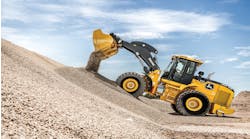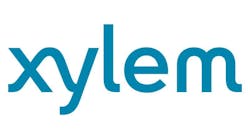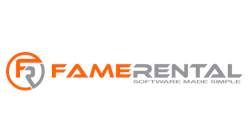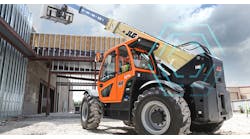Washington Air Compressor Rental Co. might be the oldest rental company in the world still doing business under its original name. If there's an older North American rental company, not only doing business under its original name but owned by the same family, the four Stecklein brothers who run it now don't know about it.
The company was founded by the Stecklein's grandfather Albert Stecklein 77 years ago in 1931. But being around a long time does not mean being set in its ways. On the contrary, Washington Air Compressor, as it is popularly known, is in the process of re-inventing itself significantly and pushing hard towards growth and expansion even during an economic downturn, a tendency that might be part of its DNA since the company was founded in the middle of the Great Depression.
Washington Air Compressor has long been multi-faceted. While the company's emphasis is on general construction rentals, it is also a dealer for several dozen lines and most recently has added a Gehl dealership affiliation in Maryland and northern Virginia, which the company expects will bring growth opportunities. Also Washington Air Compressor, very unique to the North American rental industry, has its own operator division, with trained operators available to do a wide variety of construction, concrete-cutting and drilling jobs.
Washington Air Compressor is headquartered in Hyattsville, Md., a northern suburb of Washington D.C. Its five branches form a kind of loop around the burgeoning D.C. market. Its Chantilly, Va., branch is strategically placed in fast-growing Northern Virginia. The company is still doing business in the inner city of Washington with a facility on 4th Street N.E., near where the company was founded and not far from government buildings and all that makes the capital area vibrant and historic. It also has branches in outlying Rockville and Frederick, Md.
The company's age is one of its strengths. Just like independent rental companies in virtually all major metropolitan areas, the locally owned and operated Washington Air Compressor is competing against the major national rental companies, and long-standing relationships enhance its reputation on a local and regional level. Many local construction companies have a long history of doing business with Washington Air Compressor, and many of those companies have people who recall doing business with founder Albert Sr., who died in 1981.
Albert Jr., now in his mid-70s, is still involved in the company as president, although it has been quite a few years since he regularly worked in the company's office. However, he still regularly reads construction reports and as he drives around the D.C. area, he regularly notices sites where a job will soon begin and doesn't hesitate to communicate with Washington Air staff. When he sees work being done on a building, he often remembers when equipment from Washington Air helped build that building. And if he sees a competitor's equipment on the site of a building that Washington Air helped build, he doesn't hesitate to pick up the phone.
“He still knows every jobsite that's being started, and every contractor on every jobsite,” says Danny Bowling who joined Washington Air a year ago as general manager of operations and vice president of new equipment sales. “If he's driving down the road and sees a sign that says there's going to be something here in 2015, he's on the phone wanting to know if we're getting equipment ready for that job.”
“Or if they're re-doing a building, or putting something up right next to one that's been sitting there for 20 years, he'll remember the job before and he'll call and tell us that 30 years ago they hit rock on that site right next door, and exactly where it was,” adds Brian Stecklein, now the company's vice president of operations.
Albert Stecklein Sr. began Washington Air Compressor Rental Co. in 1931, renting truck-mounted air compressors. Like many of the early rental companies, the rental portion of the business was almost an accident. He owned and operated an automobile repair garage, and when he had some available space, he leased it to a Pennsylvania contractor to store a pair of Schramm air compressors. When the contractor finished the government project, he couldn't pay his space rental fees so he left the compressors in lieu of the rent.
A few of Stecklein's customers had inquired about using the air compressors, so he decided to rent them as a side business. Because the large air compressors were heavy to transport, Stecklein figured out a way to mount them on used Coca-Cola trucks (both the air compressors and trucks were red, Stecklein's favorite color), thus developing some of the earliest truck-mounted air compressors. Stecklein rented them with operators and eventually grew the fleet to about 70 trucks with air compressors.
While Stecklein's achievement in building a successful rental company in the middle of the Great Depression was significant in retrospect, even greater may be the development of that truck-mounted air compressor. Stecklein, essentially a mechanic with an eighth-grade education, didn't set out to be an inventor any more than he had the idea of starting an equipment rental business, a concept virtually unknown at the time. But, necessity being the mother of invention, he needed to make a living during a difficult time and needed a way to transport the large red air compressors, so he used his mechanical aptitude to figure out a way to attach the units to trucks.
“He fabricated them, he fixed them, and he grew the business,” says Steve Stecklein, now Washington Air's executive vice president and CEO. “He had a painter who hand-painted every word and every phone number on the vehicles and the compressors. He created the whole package.” Steve has correspondence between his grandfather and Schramm, recommending modifications and playing a major role in the ongoing design of the compressors.
By 1940, Stecklein had nine compressor trucks and employed one person in the office, one in the shop and nine or 10 operators. Stecklein devoted himself to making collections and visiting potential customers to promote the service. He also rented jack-hammers, rock drills, tampers, saws and pumps. In its peak, the company had more than 30 truck-mounted units, and a wide variety of breakers and other air tools.
For years, Washington Air Compressor essentially rented anything related to air — air hammers and air pumps, air-powered breakers. “In later years, as demands changed, equipment became more hydraulic, so we began picking up different lines,” says Kevin Stecklein, corporate accounts manager. Since air compressors and air equipment are used a great deal in foundation work, Washington Air Compressor got involved in earthmoving equipment such as skid-steer loaders and mini-excavators, and, eventually, larger earthmoving units, which became more possible for the company once it moved its headquarters outside the inner city area and had more available space.
Washington Air Compressor now carries a wide variety of construction-oriented inventory including telehandlers up to 56 feet, straight-mast forklifts, aerial work platforms up to 130 feet, concrete equipment, demolition hammers, lighting equipment, compaction equipment, saws, surface-preparation equipment, sandblasting equipment, generators up to 600 kVa, pumps, log splitters and more.
While the company uses the motto “much more than air compressors” to avoid being limited by its long-standing name, the company has a large fleet of air compressors that range in size up to 1,600 cfm.
Historically, however, the company is careful about adding lines. “My grandfather started the business during the Depression,” says Steve. “He wouldn't do anything without paying 100 percent cash. So, we were always careful about new equipment lines where there was risk and liability. We'd say, ‘Let's be cautious and let the manufacturing catch up and make safety improvements,’ because safety is a core value.”
Filling the gap
Washington Air Compressor's reputation was established on the basis of its service, its fleet and the fact that it could send workers out to do the job for the contractor. The company still has an equipment operator division operating out of its Hyattsville headquarters, sending operators out to do the work on truck-mounted air compressors, backhoes, concrete saws, core drills, crawler loaders, excavators, floor grinders, forklifts, planers, rollers, sandblasters, scabblers, skid-steer loaders, snow removal equipment, dozers, and virtually any machine Washington Air rents.
The operator business has remained a strong supporting business and has been counted on by many of the company's contractor customers to augment their existing labor force with skilled, experienced, trained operators.
“We're able to become an extension for a company,” says Bowling. “For example, if a company does X amount of jobs, but didn't plan on getting them all at the same time, they're able to call us to come in and do certain pieces of those jobs to fill the gap as opposed to them going out and hiring employees. They're able to just fill the gap with us.”
Family values
Keeping a business in a family for 77 years is an amazing achievement in any industry, especially the rental industry where such businesses — especially those with any kind of regional reach — were the primary target of consolidators in recent years. While national companies made offers for Washington Air in the late 1990s, the Stecklein family was committed to keep the business in the family and has managed to avoid the kind of family rivalries that make family continuity so difficult.
Now the third generation of Steckleins is running the company. Although Albert Jr. is still president, the day-to-day operation of Washington Air Compressor is handled by Steve Stecklein, executive vice president and CEO; Brian, vice president of operations; Kevin, corporate accounts manager, and Albert III, who oversees credit and collections.
“As an outsider coming to work here, one of the things I found interesting is that these guys have done a great job staying in their positions without power struggles,” says Bowling. “I've worked for other family-owned businesses where there are a lot of power struggles between people who want to make the decisions, but not here. And that's part of our success and longevity — that everybody recognizes that they have a job to do and are ready to do it.”
The relationship between the Stecklein brothers is enhanced by each having their own area of responsibility with a lot of room to develop and play a role in growing the company. Part of the Stecklein family's ability to subdue egos is that every brother has started at the bottom and worked their way into positions of responsibility.
“When I first started, I was doing pressure washing,” says Brian, who now works closely with Bowling and is particularly responsible for fleet management — deciding what inventory to carry, what to sell and what to buy. “From the very beginning, I was taking tires off trucks, I was painting, I was doing a little bit of everything. I've run the parts department, I've run the sales department, I've run dispatch, I've run a store — I've done just about everything at one point or another.”
“Their dad's philosophy was you had to start at the bottom,” says Bowling. “For a long time, there were other presidents that were not in the family and these guys had to earn their right to kind of grow into the business.”
Kevin remembers “painting equipment, working in the yard, driving and delivering. I was even an operator for quite some time.” Now Kevin concentrates on building relationships with executives of many of the accounts and developing new accounts. “I work with the larger companies,” he says. “It's more of an owner-to-owner relationship. I meet with owners and purchasing agents and guys in the field a little as well.”
The brothers got involved in the business at a young age as the telephone in the house would often ring in the evenings with work-related calls. “The phone always rang at our home for off-hours support and my father would field the calls,” recalls Steve. “We would go with him on a call to help customers to back up our service with our operators. I recall going out to a jobsite where our operators were working and we would have to run to the hardware store at 8:30 or 9:00 at night to buy fittings or parts to help them keep working that night. My brothers and I would answer the phones at home ever since I can remember.
“Customers would call our father or our grandfather, our phone number was always listed or they'd have our notepads and calendars and our home phone number was always on it.”
Eventually the Stecklein brothers convinced their father that it was necessary to develop a phone-answering system that went beyond his house, so that customers could be taken care of by any employee, not just the immediate family. The company offers 24-hour service and the off-hours system is always taken care of by a Washington Air employee, not a call center. But the Stecklein family attitude of answering the phone at home never went away and always remained part of the spirit with which Washington Air approaches customers.
“The difference between us and some of the other companies is when you call the number, it's a Washington Air employee that answers the phone, it's not a call center,” says Bowling. “There's a rotation of people who are going to take that call and they have a team of drivers, mechanics and managers that are going to execute whatever it is that needs to be done.”
Family continuity has provided stability in other areas such as banking. “We're only on our third bank today,” says Steve. “We've been in business 77 years and we've only dealt with three banks.”
A dealer's hand
Washington Air Compressor serves as a dealer for most of the lines it rents, a capability enhanced by its strong service department. When Schramm didn't keep up with its competition and the Steckleins began looking at different air compressors, it eventually established a relationship with Ingersoll Rand that lasted decades. Today Washington Air is a dealer for several dozen lines including Bull Dog Power Products, Dri-Eaz, General Equipment, Edco, Genie, Dynapac, Honda, Kent Demolition Equipment, Mi-T-M pressure washers, Stone, Takeuchi, Vulcan, Wacker and Tsurumi. With the new Gehl line, Washington Air Compressor is selling and renting a large volume of Gehl forklifts and skid-steer loaders.
Bowling, who joined Washington Air after stints with Sunbelt Rentals and a Bobcat dealership, has seen the pure rental side of the business as well as the dealership side and is confident Washington Air has the right stuff to do both.
“We're a true dealer,” says Bowling. “We stock parts, we stock consumables and we have the ability to do the repairs. We're warranty dealers from top to bottom, we're not just a product seller. When we make a relationship with a manufacturer, we don't want to get into a situation where we put our customer's fate into the hands of somebody else. We're going to support the product and we can go to the customer and say ‘it's on us.’ ”
“We expect the manufacturer to understand that we are going to do the best job we can for them in our market,” adds Steve. “We relay that commitment to our customers. To us, that's the right chain and we don't want any broken links.”
Still, ultimately, it is rental that drives the Washington Air Compressor growth to which the Steckleins are deeply committed, with plans to deepen the company's penetration into the Washington area as well as expanding to points beyond. While not wishing to elaborate on the details, Steve says the company has an expansion plan to expand the company's services as well as geographic reach.
The company's management, meanwhile, is searching for ways to take customer service to a higher level. Bowling points out that people in the rental industry typically say that good service is being on time, providing equipment that works and resolving problems and breakdowns in a reasonable time. “But that's what we're supposed to do,” he says. “We need to go beyond that. If a machine fails, we need to ask, ‘Why did it fail?’ Are we doing something wrong?”
The answer might not be answered immediately but Washington Air Compressor Rental Co. gives every indication of being a company not only looking to get bigger, but to perform at a higher level. Another key is the lack of ego in the company, with the focus of all activity being the customer. “That's who we all really work for,” Bowling says. “They don't work for me or anybody specific in management, because we're not spending money, we're not renting equipment. We all just work for the customer.”





